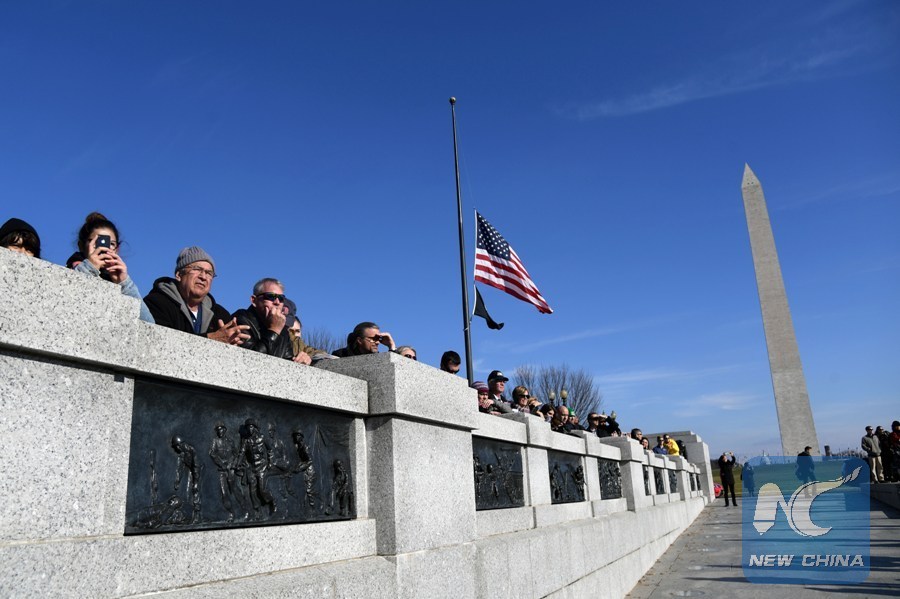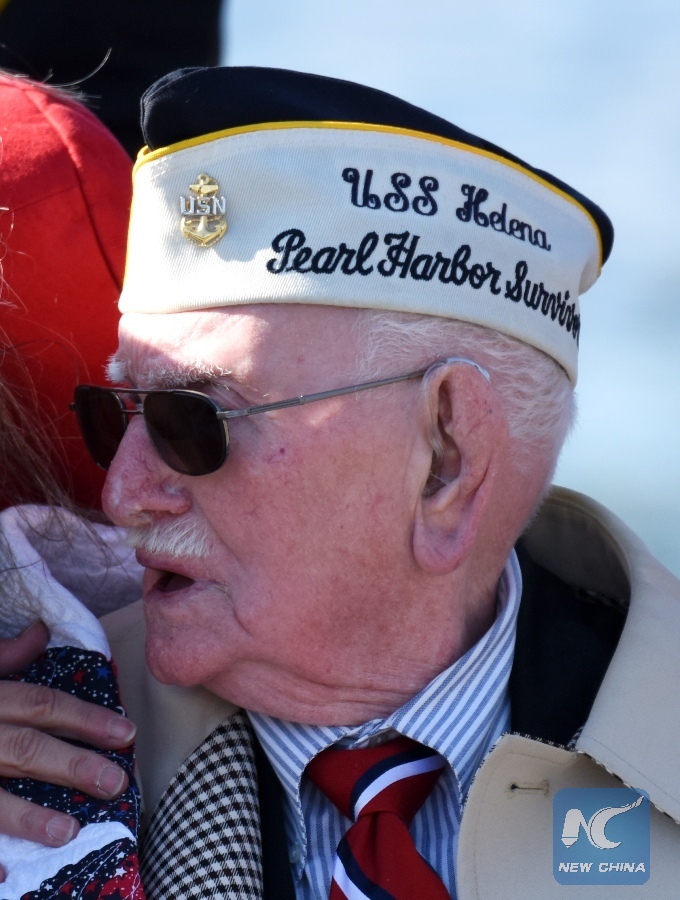
People attend the 75th anniversary commemoration of Pearl Harbor attack, at the World War II Memorial in Washington D.C., the United States, Dec. 7, 2016. (Xinhua/Yin Bogu)
WASHINGTON, Dec. 7 (Xinhua) -- The United States on Wednesday marked the 75th anniversary of the Japanese attack on Pearl Harbor, Hawaii that claimed more than 2,400 American lives.
As many as 2,403 Americans were killed and about 20 U.S. vessels were sunk or damaged and over 300 U.S. aircrafts were damaged or destroyed when over 350 Japanese warplanes launched attacks stealthily.

A Pearl Harbor survivor veteran is seen during the 75th anniversary commemoration of Pearl Harbor attack, at the World War II Memorial in Washington D.C., the United States, Dec. 7, 2016. (Xinhua/Yin Bogu)
For the remaining survivors, the nightmarish scenes of Japanese ferocity linger on even after over seven decades.
"I can't forget it. I never will," said 104-year-old survivor Ray Chaves in an interview with NBC News.
"In the hours after the attack, President Roosevelt promised that 'the American people in their righteous might will win through to absolute victory.' Thanks to the heroism of a generation, we did," said U.S. President Barack Obama in a statement.
The attack came as a shock to the Americans and directly led to U.S. entry into World War II.
On Aug. 6, 1945, the United States dropped an atomic bomb on Hiroshima, Japan. Another U.S. nuclear strike was launched on the Japanese city of Nagasaki three days later. Japan surrendered on Aug. 15, 1945.

U.S. Vice President-elect Mike Pence(2nd R), U.S. Republican Senator John McCain(3 R) and Pearl Harbor survivor veteran Bill Flatters attend the 75th anniversary commemoration of Pearl Harbor attack, at the World War II Memorial in Washington D.C., the United States, Dec. 7, 2016. (Xinhua/Yin Bogu)
As the Americans were mourning the colossal loss inflicted by the Japanese, the news came that Japanese Prime Minister Shinzo Abe, unpopular among the Asian countries for his unapologetic approach to Japan's wartime history, would visit the Arizona Memorial at Pearl Harbor at the end of December.
However, observers said that Abe was not expected to apologize for the attack on Pearl Harbor.
Abe's unexpected decision to visit Pearl Harbor came about six months after Obama visited Japan's Hiroshima early this year.

People attend the 75th anniversary commemoration of Pearl Harbor attack, at the World War II Memorial in Washington D.C., the United States, Dec. 7, 2016. (Xinhua/Yin Bogu)
Apart from reciprocating Obama's visit to Hiroshima, Abe's upcoming trip to Pearl Harbor was believed to be the latest step by the Japanese government to strengthen the Japan-U.S. alliance before U.S. President-elect Donald Trump's inauguration next January.
During his presidential campaign, Trump repeatedly ripped U.S. defense of Japan as one-sided and expensive deal.
Japan's Kyodo News quoted a senior Japanese official as saying that since the election of Trump, Japan had been forced to think how best to show Trump that Japan was a trustworthy partner.

